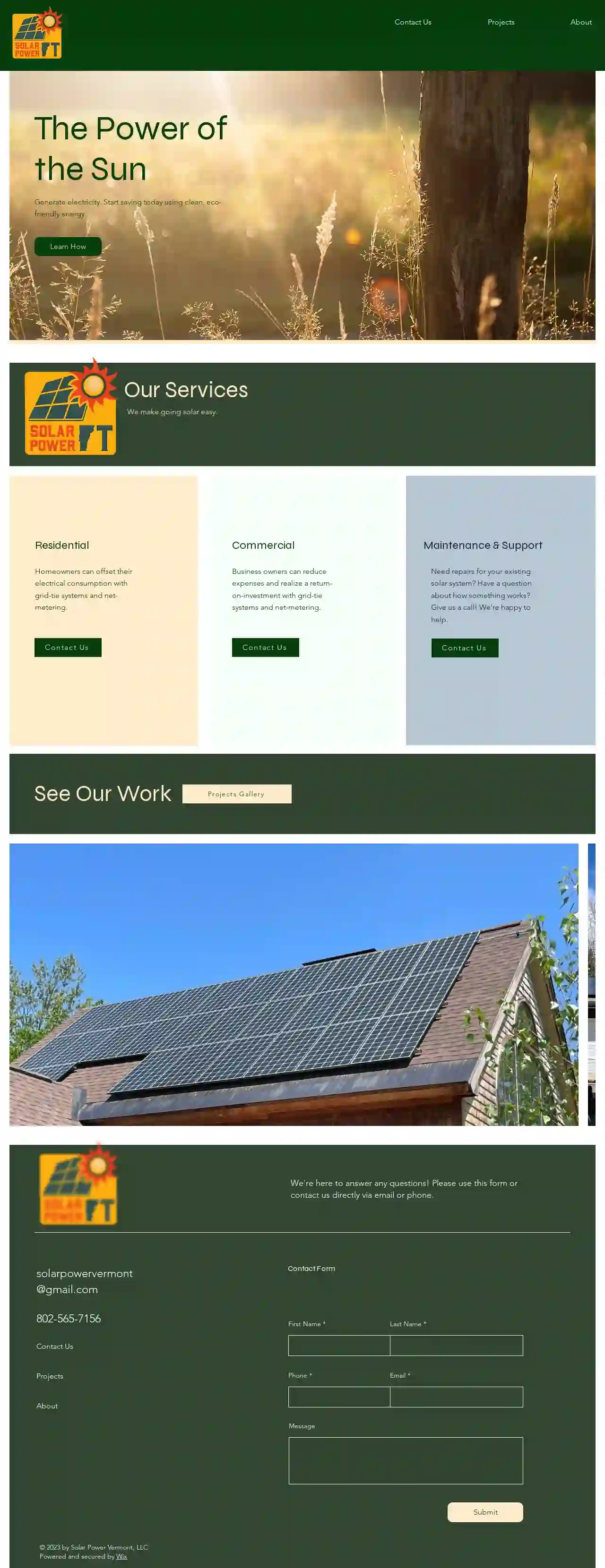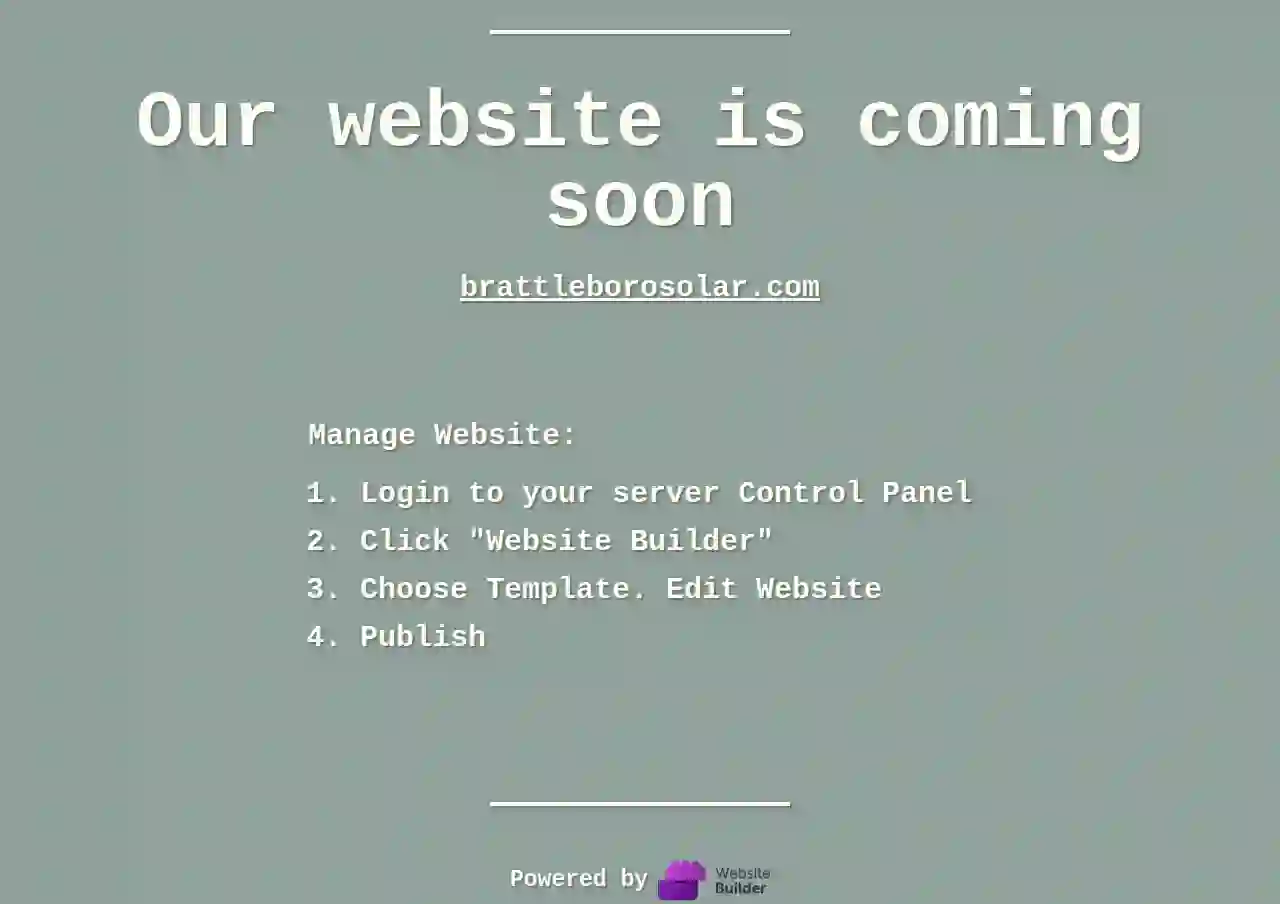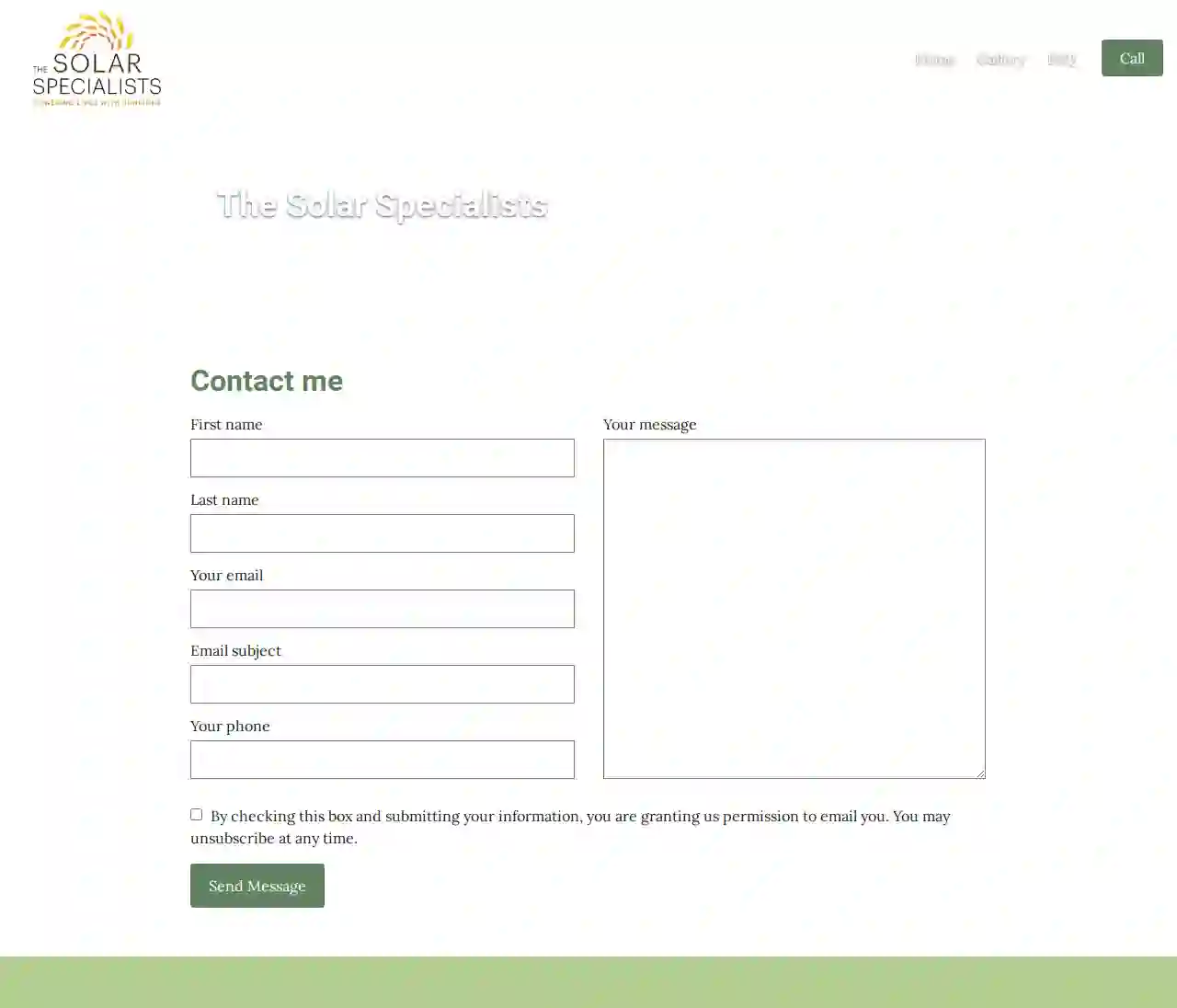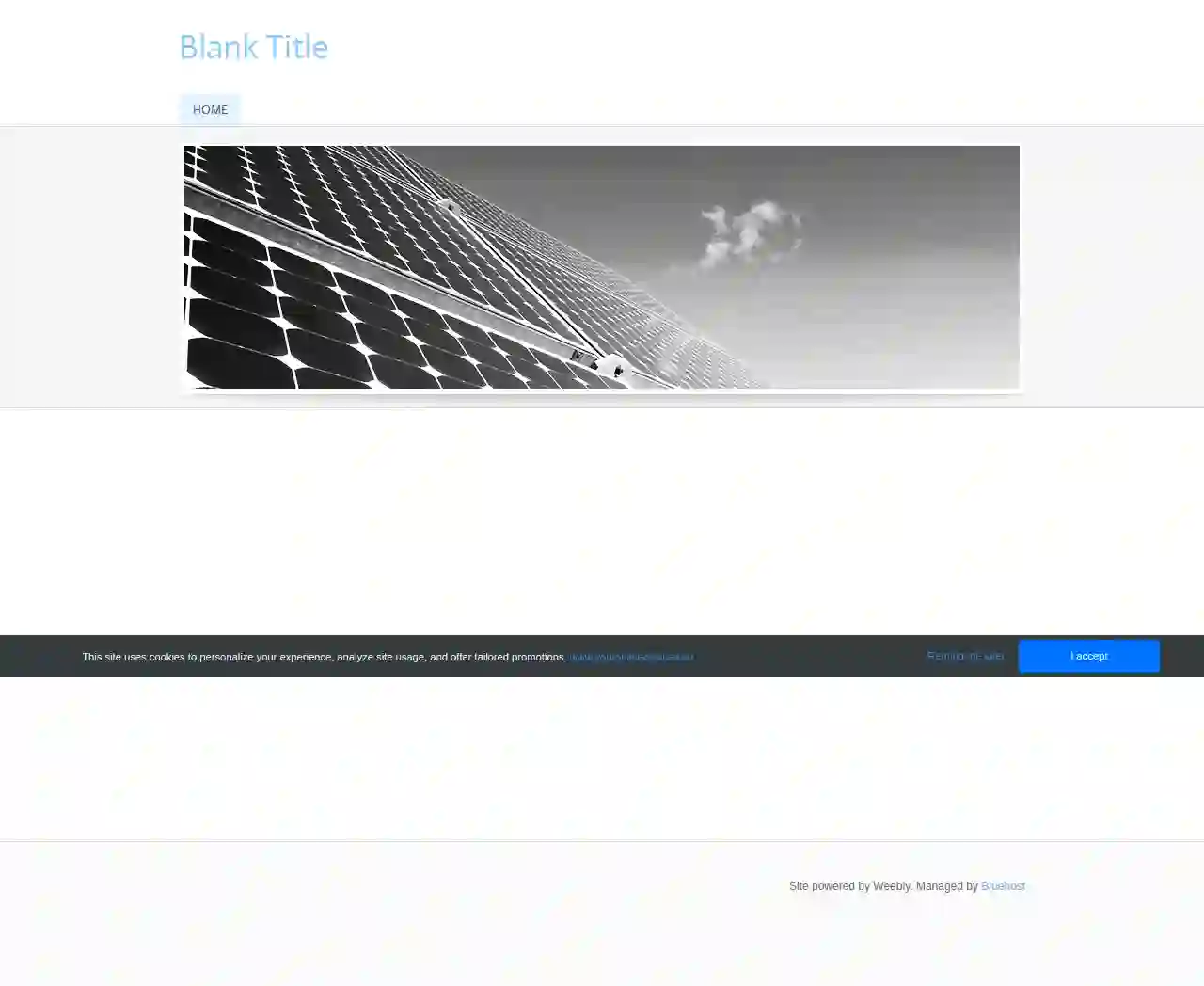Commercial Solar Installers Bridgeport
Top 10 Commercial Solar Company in Bridgeport
Get 3 FREE Commercial Solar Panel Installation quotes for your project today! Compare profiles, reviews, accreditations, portfolio, etc... and choose the best offer.

United States Solar Corporation (US Solar)
32 reviews100 N 6th St, Suite 410B, Minneapolis, 55403, USUS Solar is a developer, owner, operator, and financier of solar generation and storage projects with a focus on emerging markets and community solar programs. With primary offices in Minnesota and Connecticut, we make it easy for residents, public entities, and businesses to minimize the hassle and maximize the benefits of solar.
- Services
- Why Us?
- Accreditations
- Our Team
- Testimonials
- Gallery
Get Quote
Solar Power Vermont
Newark, Town of, VT, United States of America, 596 School House Rd, 05871, USAt Solar Power VT, we specialize in providing comprehensive solar energy solutions for residential and commercial clients, with a primary focus on residential projects. Our services encompass every aspect of solar power, from sales and design to installation and maintenance of solar panels and battery backup systems. Our expert team is dedicated to helping you harness the power of the sun to reduce your energy costs and carbon footprint. Whether you're looking to install a new solar system or maintain an existing one, Solar Power VT is your trusted partner for reliable, sustainable energy solutions.
- Services
- Why Us?
- Accreditations
- Our Team
- Testimonials
- Gallery
Get Quote
Connecticut Sun Nerds Solar Brokers
11 reviewsNewington, CT, 49 Adam Drive, 06111, USConnecticut Sun Nerds Solar Brokers is a solar energy company based in Newington, CT, serving all of Connecticut. They offer solar energy solutions through buying, leasing, or getting a solar loan. Their main advantage is that they put your installation up for bid, inviting multiple solar installers to bid for your system and submit the best price and package to win the bid. They also provide battery energy storage incentives and have a team of experts to help you make the change to solar today.
- Services
- Why Us?
- Accreditations
- Our Team
- Testimonials
- Gallery
Get Quote
Same Sun Of Vermont Inc
4.213 reviews141 West Street, Rutland, 05701, USSame Sun of Vermont is a family-owned and operated business established in 2011 by Rutland Town residents Marlene and Philip Allen. The company began as a response to the growing demand for solar energy solutions and has since expanded to provide services including solar installation, EV charger installation, and solar service and repair. Same Sun is dedicated to empowering homeowners and business owners through the creation of their own energy, using American-made products and providing local good-paying jobs.
- Services
- Why Us?
- Our Team
- Gallery
Get Quote
Mountain Energy Design
82 Mountain St, Bristol, Vermont, 05443, USMountain Energy Design is a trusted partner in Bristol, Vermont, offering a comprehensive range of services from solar panel installation to custom energy-efficient home design and renewable energy solutions statewide. With a commitment to sustainable living, they provide solar energy consultation services, tailored to meet unique energy needs. Their expertise extends to municipal solar projects, utility-scale installations, and sustainable home construction.
- Services
- Why Us?
- Accreditations
- Gallery
Get Quote
Brattleboro Solar Management
51 reviews123 Solar Street, Suite 101, Brattleboro, 05301, USBrattleboro Solar is a local business dedicated to providing solar energy solutions. Our mission is to help our community transition to renewable energy sources, reducing carbon footprint and energy costs. Our team of experienced professionals offers a range of services including solar panel installation, maintenance, and consultation. We are fully accredited and insured, ensuring our clients' peace of mind. With over 15 years in business, we have built a reputation for reliability and quality service.
- Services
- Why Us?
- Accreditations
- Our Team
- Testimonials
- Gallery
Get Quote
The Solar Specialists
Worcester, VT, 123 Solar Lane, 05676, USThe Solar Specialists, founded by Doug Wells, is a company dedicated to promoting sustainability in the community through the design and installation of renewable energy systems. With a focus on solar energy, they aim to help clients achieve energy independence and create a better future. Their services include design and installation of solar electric systems, site analysis, consulting, and maintenance of older systems. They specialize in battery-based design for both off-grid and grid backup systems.
- Services
- Why Us?
- Accreditations
- Our Team
- Testimonials
- Gallery
Get Quote
Last Stop Solar
52 reviewsNew York, NY, USA, 123 Solar Street, 10001, USLast Stop Solar is a company that specializes in providing solar energy solutions to homeowners. They offer a variety of services including solar installation, solar education, and personalized financing options. Their mission is to help families save money on their electricity bills by switching to solar energy. They use Tier 1 equipment and offer customized solutions for each home. They also provide a free solar tax evaluation and guarantee 100% satisfaction.
- Services
- Why Us?
- Accreditations
- Our Team
- Testimonials
- Gallery
Get Quote
Son Energy Systems
57 reviews123 Solar Street, Suite 100, Solar City, 12345, USSite powered by Weebly. Managed by Bluehost
- Services
- Why Us?
- Accreditations
- Our Team
- Testimonials
Get Quote
SOLARFOX USA
Hartford, USSolarfox is a company that specializes in creating public solar displays to showcase energy to the public. Their displays visualize energy data from renewable energy sources and solar power systems in commercial or public buildings. They support many of the world's leading solar monitoring systems and data loggers, enabling cross-vendor visualization regardless of location and number of systems. Solarfox helps companies lead by example and boldly makes their contribution to sustainability and climate protection evident.
- Services
- Why Us?
- Accreditations
- Testimonials
- Gallery
Get Quote
Over 4,210+ Solar Installers registered
Our solar contractors operate in Bridgeport & surrounding areas!
SolarCompaniesHub has curated and vetted Top Solar Installers in Bridgeport. Find a top & reliable contractor today.
Frequently Asked Questions About Commercial Solar Installations
- Efficiency: Higher-efficiency panels produce more energy from the same amount of sunlight, but they may have a higher upfront cost.
- Space Availability: If you have limited roof or ground space, higher-efficiency panels allow you to maximize energy production.
- Aesthetics: Consider the visual appearance of the panels and how they integrate with your building or surroundings. Monocrystalline panels tend to have a more sleek and modern look, while polycrystalline panels have a more traditional blue appearance.
- Cost: Polycrystalline panels are generally more budget-friendly, while monocrystalline panels tend to be more expensive.
- Durability and Warranty: All types of solar panels are designed to be durable, but some manufacturers offer longer warranties or better performance guarantees.
- Uses high-quality mounting hardware
- Follows industry best practices
- Has a good understanding of roofing systems
- Site Assessment and Consultation: A qualified Commercial Solar Installers will visit your property to assess your energy needs, roof or ground suitability, and discuss your project goals.
- System Design and Proposal: The installer will design a solar system that meets your requirements and provides a detailed proposal outlining the system size, cost, expected energy production, and financial incentives.
- Financing and Incentives: Explore financing options, such as solar loans, leases, or PPAs, and identify applicable tax credits or rebates to make your project more affordable.
- Permitting and Approvals: The installer will obtain necessary permits and approvals from your local building department and utility company.
- Installation: The solar panels, inverters, wiring, and other components will be installed according to the approved design.
- Interconnection and Commissioning: The system will be connected to the grid, and the utility company will conduct final inspections and activate your system.
- Monitoring and Maintenance: Your solar system will typically be monitored remotely for performance. The installer or a maintenance provider will handle any necessary maintenance or repairs.
How do I choose the right solar panel type for my business?
Will solar panels affect my roof warranty?
What is the future of commercial solar?
What is the process for installing a commercial solar system?
How do I choose the right solar panel type for my business?
- Efficiency: Higher-efficiency panels produce more energy from the same amount of sunlight, but they may have a higher upfront cost.
- Space Availability: If you have limited roof or ground space, higher-efficiency panels allow you to maximize energy production.
- Aesthetics: Consider the visual appearance of the panels and how they integrate with your building or surroundings. Monocrystalline panels tend to have a more sleek and modern look, while polycrystalline panels have a more traditional blue appearance.
- Cost: Polycrystalline panels are generally more budget-friendly, while monocrystalline panels tend to be more expensive.
- Durability and Warranty: All types of solar panels are designed to be durable, but some manufacturers offer longer warranties or better performance guarantees.
Will solar panels affect my roof warranty?
- Uses high-quality mounting hardware
- Follows industry best practices
- Has a good understanding of roofing systems
What is the future of commercial solar?
What is the process for installing a commercial solar system?
- Site Assessment and Consultation: A qualified Commercial Solar Installers will visit your property to assess your energy needs, roof or ground suitability, and discuss your project goals.
- System Design and Proposal: The installer will design a solar system that meets your requirements and provides a detailed proposal outlining the system size, cost, expected energy production, and financial incentives.
- Financing and Incentives: Explore financing options, such as solar loans, leases, or PPAs, and identify applicable tax credits or rebates to make your project more affordable.
- Permitting and Approvals: The installer will obtain necessary permits and approvals from your local building department and utility company.
- Installation: The solar panels, inverters, wiring, and other components will be installed according to the approved design.
- Interconnection and Commissioning: The system will be connected to the grid, and the utility company will conduct final inspections and activate your system.
- Monitoring and Maintenance: Your solar system will typically be monitored remotely for performance. The installer or a maintenance provider will handle any necessary maintenance or repairs.